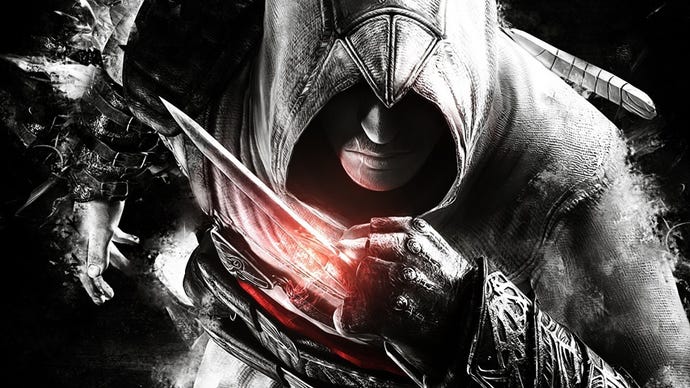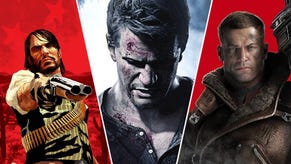Nine tips for Ubisoft to help save Assassin's Creed
It's been a tumultuous year for Ubisoft. What's the state of Assassin's Creed as we close out 2014?
Assassin's Creed took a beating this year. Unity isn't a bad game, by any means, and in all fairness I think its bugs aren't significantly worse than, say, Dragon Age: Inquisition, which has received a much more positive reception. But as I've already argued, Ubisoft shot itself in the foot with that review embargo nonsense, and Unity now has a poisonous reputation regardless of its many virtues.
It had to happen eventually. Ubisoft takes greater care of its flagship annual franchise than other publishers have, but I think it's worth remembering that many of the publishers who embraced the annualisation trend have since collapsed. Only Call of Duty and sports games seem immune to that curse.
Assassin's Creed is now seven core entries in. Think about that. If Ubisoft had maintained conventional numbering, Unity would have been Assassin's Creed 7. How many modern franchises, besides Final Fantasy, ever have numbers that large attached to them? Bugger all, is the answer; there's a good reason why Call of Duty threw it out the window, and it's that big numbers like that tend to go along with smaller sales. You can stave off franchise fatigue a lot longer if you quietly kick the numbers under the rug after about four entries.
But nothing holds off franchise fatigue forever. There will come a day when even the mighty juggernauts of Call of Duty and Grand Theft Auto will fail, if they don't evolve fast enough. Assassin's Creed, while one of the blockbuster, powerhouse properties of the industry, is not immune to that.
I don't think the Assassin's Creed ship has sailed, necessarily. Ubisoft has made a number of mistakes over the past few years, but it is already showing signs of trying to correct them. Next year will probably be the sticking point. Let's take a look at what the publisher can do (and in some cases has already begun to do) to shore up the property and stave off franchise fatigue.
#1: Stop releasing so many games.
Even ignoring the side-scroller spin-off, companion apps and other distractions, we had two Assassin's Creed games this year - Rogue and Unity. That's at least one too many. Ubisoft had good reasons for producing a past- and current-gen release this year, and the sales will likely make up for its investment, but by being inclusive of those yet to upgrade to newer hardware, Ubisoft risked tiring out fans. I smashed Unity, eventually - and now the thought of doing all that again makes me feel a bit sick, even though Rogue has received very good reviews. Assassin's Creed games are just too huge to expect us to finish two in any given year. It sounds like we'll only get one next year, which is a bit sad for PS3 and Xbox 360 fans, but the franchise will be better off for it. It would be even better for a year off, to be honest.
#2: Give Ubisoft Montreal a break.
Although Ubisoft spreads development duties out across multiple studios, until the 2015 entry, Ubisoft Montreal had always taken the lead development role. Over the years leading up to Unity, it was developing huge new technology, while at the same time leading development on older tech for Assassin's Creed 4: Black Flag. The team itself has said it just had no time to try out new things, and is grateful to have handed the series off to Ubisoft Quebec for at least one year. Go whole hog on this one, Ubi; give your teams the time they need.
#3: Maybe lay-off the multi-studio approach a bit.
Hundreds of people work on each Assassin's Creed game, and some of them never meet each other, because they're on other sides of the world. This approach isn't necessarily bad, because there's no reason not to get a lot of the grunt work of development done elsewhere (outsourcing is pretty common even among developers with only one team to their name). But Assassin's Creed: Unity in particular had a modular feel; you could see that the people in charge of creating side content, and the people in charge of making the main missions, and the people making the core tech powering Paris, weren't necessarily looking at the project as a whole game. As a result, the setting and content feel kind of disconnected from each other. It astounds me that "developed by umpteen studios" is being used in promotional materials as if it were a selling point and not cause for serious alarm.
Next: six more pieces of advice on how Ubisoft can keep the Assassin's Creed ship from sinking.
#4: Make assassinations more memorable.
Unity already had a stab (ah ha ha) at this, but it wasn't entirely successful. The huge infiltration environments and optional opportunities were great fun, and made assassinations feel like more than the stabbing you get up to while running about the streets, but there was so little room for improvisation or creativity that they ended up being very scripted experiences. Ubisoft does such a good job of enabling emergent gameplay in Far Cry, and there are some great cues in classics of the stealth genre like Hitman and Dishonored. Ubisoft should think very hard about what it wants the assassination experience to be, because, well - it's in the title of the game, innit. It should be the best bit. On that note...
#5: Quit design-by-numbers and figure out what the heck you're doing.
Nobody at Ubisoft has any idea what Assassin's Creed is actually about, and so every release wanders off to do something else. In some ways I really like this, and I really enjoyed the base-building of Assassin's Creed 2 and Brotherhood, as well as the sailing in Black Flag and trade empires in Assassin's Creed 3. But I feel like there's room to experiment with these systems, and even have them play major roles in the overall design, while still doubling down on what it is that makes Assassin's Creed itself special. What is that? I don't know. Fans will tell you it's the stealth, or the assassinations, or the crowds, or the historical tourism, but none of these aspects have been especially successful for several entries now, and certainly aren't getting the kind of design focus they need to truly shine. Instead of throwing in new systems and mechanics every time (and, as discussed above, putting multiple teams on them), Ubisoft should ease off the focus testing and design the game the old-school way: as a complete, one-piece experience tightly focused on the core strengths of the formula. The core strengths, Ubi; not abstract "design pillars".
#6: Push the writing
On a related note, Ubisoft should retain and celebrate the things it's done right this time. Both Rogue and Unity have drawn praise for their story-telling, for quite different reasons. Ubisoft should take a good long look at the reception to both games and figure out what it's doing right. Protecting the canon isn't all you need to do to make your universe a place of rich, compelling stories and characters - and if you don't have rich, compelling stories and characters, the scales fall from our eyes and we suddenly realise we're doing endless fetch quests when we could be outside in the fresh air.
#7: Do something with all that amazing city and crowd tech.
Unity's version of Paris is undoubtedly one of the best cities we've ever seen in a video game. The huge crowds are genuinely impressive. Wandering its streets is a sheer pleasure, and its been designed with a good eye for providing free-run opportunities without consequently leaving it looking like token textures slapped on mechanics-focused geometry. Sadly, it's just not that great a place to actually play a game in. The touted "dynamic" crowds are annoying to move through and rarely provide gameplay opportunities. The "living, breathing city" boils down to the same tiny handful of optional gameplay events occurring so frequently as to be laughable. Nothing you do seems to make any difference to the city. You may as well be back in Rome, really.
#8: Go somewhere else.
One of the best things about the first Assassin's Creed was it showed us something of the world in a way other video games hadn't. Most games that take us into the middle east cast us as American or at least definitely western soldiers and have us mowing down enemies. Assassin's Creed made us a local, and explored the setting from a perspective in which the European presence was invasive, not gloriously justified by terrorism or liberation or whatever we're calling our oil greed nowadays. That was super interesting. Since then, though, it's been very Euro-centric. Italy. The US. Paris. And now London. Black Flag is the only one to deviate from the endless parade of thoroughly western settings, and even then it is preoccupied with European and American matters. Let's go somewhere else, be somewhere else, and maybe learn a thing.
#9: Definitely make sure it works.
Yeah, no, let's not have another balls-up like the Unity launch. Delay the next one, if you have to. Delay it substantially. You can afford it.

















